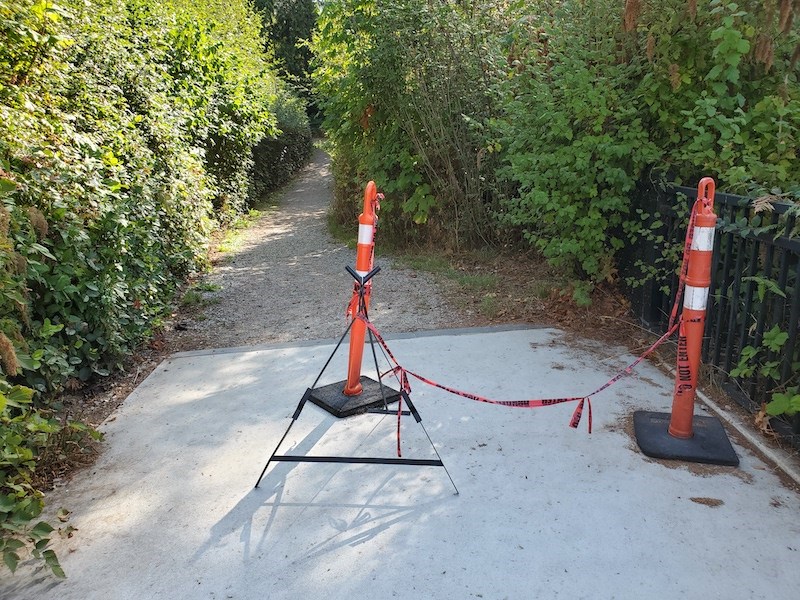As the conflict between Stanley Park's resident's coyotes and people continues to increase, the message from the BC Conservation Office Service (COS) is clear: don't feed the animals — any of them.
Conservation Office Service Insp. Drew Milne and Donnie Rosa, General Manager of the Vancouver Board of Parks and Recreation, spoke to reporters outside of the Vancouver Aquarium on Wednesday (Sept. 1) afternoon about the number of attacks in the park.
"As of today, we've had 45 confirmed reports of attacks," Milne reported, gravely.
There were three additional coyote attacks in the last 24 hours and two were on four-year-old children. "I'm happy to report that both children are in good shape and are in good spirits as well."
The third attack was on a "large individual," which Milne said demonstrates that "this can happen to anyone."
The COS will continue to work with the Park Board and municipalities to find a solution, he added, noting that there are multiple situational factors that must be investigated, including feeding.
"We've received some reports of individuals feeding the animals for photography reasons but also because they believe they are doing the right thing," he explained. "That is a disservice to the wildlife; we are inadvertently going to kill the wildlife because of that.
"The coyotes are demonstrating this behaviour because of feeding as well as other situational factors."
Conservation Officers killed one coyote in the park Wednesday morning. The coyote was highly habituated and showed no fear of people – it walked up to within one metre of officers who were shaking a container of food.
Will the COS cull the coyotes in the park?
Conservation officers will investigate attacks on an individual level, explained Milne, but they won't conduct a full-scale cull of the coyotes. "That's not the mandate of the BC Conservation Office Service."
The COS will continue to educate people about the dangers associated with feeding wildlife and will ticket anyone feeding dangerous wildlife in Stanley Park. However, the officers can't fine individuals for feeding animals that aren't considered "dangerous" — but they shouldn't feed any of the animals.
"It's not the right thing to do to feed any sort of wildlife in the park," said Milne.
How much is a fine under the BC Wildlife Act for feeding dangerous animals?
In 2019, a B.C. man was fined $2,000 and ordered to stay a minimum of 50 metres from bears for six months after he fed bears from his vehicle while driving along the Alaska Highway.
But the B.C. Wildlife Act also stipulates that people must not "provide, leave or place an attractant in, on or about any land or premises with the intent of attracting dangerous wildlife."
"They don't need anything from people; they have everything they need in the park."
Fur-Bearers Executive Director Lesley Fox underscores that people must stop feeding the wildlife in the park. On a recent visit, she says she saw multiple incidents of people distributing food or feeding animals directly.
"Birdseed brings in rats and mice and squirrels which attracts coyotes. When there's birdseed all over the trails in public areas people think they're helping the birds but what they don't understand is it's a cascade effect," she explains.
By interrupting a natural ecosystem, all of the animals will exhibit changed behaviour, adds Fox, who says she saw people distributing shopping bags of cat food and birdseed. "They don't need anything from people; they have everything they need in the park."
She also spotted someone feeding a raccoon for close photographs, while other individuals were leaving food in the trees.
The Fur-Bearers have filed all of the photographs as evidence to the COS and reported the feeders.
Multiple studies show that culling predators may not work, she adds. In fact, it might have the opposite effect.
"Post-cull, coyotes and other species of mesopredators have been shown to demonstrate two retaliations: compensatory reproduction and compensatory immigration (Minnie et al., 2016). Compensatory reproduction refers to the observed event where, in response to a lowered population, females will demonstrate a higher reproductive output. This ultimately means a larger population of coyotes in the long run. Similarly, compensatory immigration refers to the fact that as soon as an area is cleared of an individual it is almost immediately reinhabited by a neighbouring individual (Minnie et al., 2016; Newsome et al., 2017)."
The Vancouver Park Board announced this week that Stanley Park would be closed starting at 7 p.m. to keep people out while the animals are most active.
Anyone who sees someone feeding wildlife in the park should report the incident to the Report All Poachers and Polluters (RAPP) hotline at 1-877-952-7277 (RAPP) or #7277 on the TELUS Mobility Network.
With files from the Canadian Press, Brendan Kergin and the Times Colonist.



